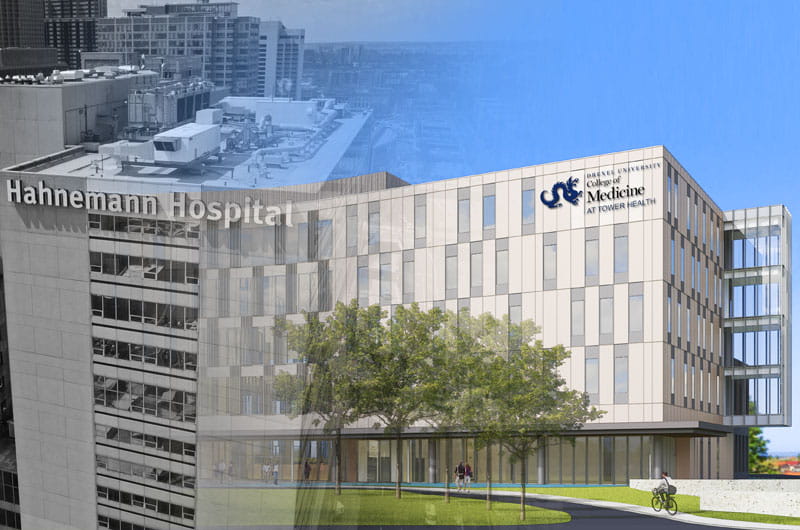常见问题:哈内曼的结尾如何影响德雷克塞尔

- Newborns Living Near Trees Tend to Be Healthier. New Data Suggests It’s Not Because Healthier People Reside Near Parks.
- Celebration of Scholarship Event Highlights Transformative Impact on Students
- How to Come Out of Hibernation
- Taste Research Suggests Pearl Millet Could be a Healthy, Sustainable, Gluten-free Wheat Alternative in the U.S.

On June 26, the owner of Hahnemann University Hospital announced it would file for bankruptcy and close the hospital within weeks. Though Hahnemann's closure has been devastating to everyone affected, Drexel is prepared.
Several years ago, Drexel leadership began seeking a successor hospital partner to prepare for the 2022 conclusion of Drexel's academic affiliation agreement with Hahnemann. As a result, earlier this year Drexel announced a 20-year academic affiliation with Tower Health, a six-hospital system with locations in the Philadelphia area, to educate Drexel medical students at a new additional location being built in Reading, Pennsylvania.
While Drexel has had to accelerate its plan by a couple of years due to the abrupt closure of Hahnemann, the groundwork already laid will minimize disruptions to people’s lives as much as is possible under the circumstances. As President John Fry says, “This is not the way in which we wanted this to happen nor the timeframe we wanted. But we had a very clear sense that this day would come. And I think we’ve been very well prepared for it.”
Here is an update on the situation and its impact.
How did we get here?
哈
What is Drexel’s relationship to Hahnemann?
Drexel doesn’t own or have investments in Hahnemann. The hospital’s operations and finances are wholly separate from the College of Medicine. Drexel’s main business relationship with the hospital is an academic affiliation agreement that designates Hahnemann as the medical school’s primary academic partner for its medical student training and provides for Drexel’s faculty to manage the hospital’s residency program through 2022. Hahnemann also contracts with Drexel for some other physician services, such as emergency room coverage and clinical services. Altogether, Hahnemann pays Drexel $24 million a year for Drexel’s services. In February, American Academic Health System fell behind in its payments, and now owes Drexel $15.2 million. Despite being AAHS’s second-largest unsecured creditor with no realistic hope of meaningful payment, Drexel has continued to provide services to ensure that the community’s health care and the medical student and residency training needs are met.
What is a resident and how does medical education generally work?
Residents and fellows are post-graduate doctors-in-training from any of the medical colleges across the country and internationally. Each year’s batch of medical school graduates “matches” with a hospital, where they train in a specialized area of medicine in a patient setting. Hospitals may be eligible to receive a payment from Medicare in exchange for the hospital providing the training of the residents and fellows. Payments are based on the direct expense of training a resident, plus other factors such as a hospital’s total Medicare patients, capacity and residents. When a hospital closes, Medicare will shift the reimbursement of each current resident to the hospital which agrees to provide the remaining years of training for that resident.
What will happen to Hahnemann’s 500-plus medical residents and fellows?
再保险
What happens to the medical students who do their clinical training at Hahnemann?
About 30 percent of Drexel’s third- and fourth-year students were in clinical clerkships at the hospital. They have all been reassigned to other hospitals including some of Drexel’s regional campus partners. These affiliates — Abington, Crozer-Chester Medical Center, WellSpan York, Allegheny General and Kaiser Permanente in California, and now Tower Health — have agreements to allow Drexel’s clinical faculty to do research and see patients at their sites.
What will happen to Drexel University Physicians, the practice group training Hahnemann’s medical students and residents?
Prior to Hahnemann’s announcement, Tower Health and Drexel already had intentions to merge the Tower Health Medical Group and Drexel University Physicians practices in January 2020. However, Hahnemann’s closure forced some painful adjustments to this plan, causing some of our health care service lines and positions to be eliminated. Fortunately, Tower Health Medical Group has agreed to offer employment to about 60 percent of the 800 faculty and staff employed by Drexel University Physicians. Those joining Tower Health Medical Group will be able to continue working in their current practices and locations. Of the 40 percent being displaced, most will be given preferential consideration for comparable jobs in the Tower Health system, though possibly outside of Philadelphia. Drexel regards this as an outstanding expression of Tower Health’s commitment to the College of Medicine and the city of Philadelphia.
What if my doctor is a Drexel Medicine physician?
Primary care physicians will continue to provide care in their current settings, as will a number of specialists. Patients who are affected by service line closures are being contacted and offered options for future care. In all cases, Drexel Medicine will work with patients’ new providers to ensure continuity of care.
Will Drexel’s College of Medicine students or faculty be impacted?
Although Drexel has taken all possible steps to smooth this transition, there has been significant disruption to our faculty and staff, and to students facing new rotational schedules. We are using all resources available to work with those affected to minimize the short-term impact. Drexel’s medical students, as well as College of Nursing and Health Professions students on clinical rotation, have already been reassigned to the more than 20 other affiliated training sites with which Drexel has agreements. Drexel will provide uninterrupted training for all students now and throughout their enrollment at Drexel. The education of undergraduate medical students and graduate students, and research, will all continue.
Couldn’t Drexel have bought Hahnemann and operated its own hospital as some other universities do?
Drexel would have been interested, if the hospital were economically viable. But Hahnemann came with liabilities of more than $300 million.
Could this undermine the College of Medicine’s stature or reputation?
Th
In This Article
Drexel News is produced by
University Marketing and Communications.
